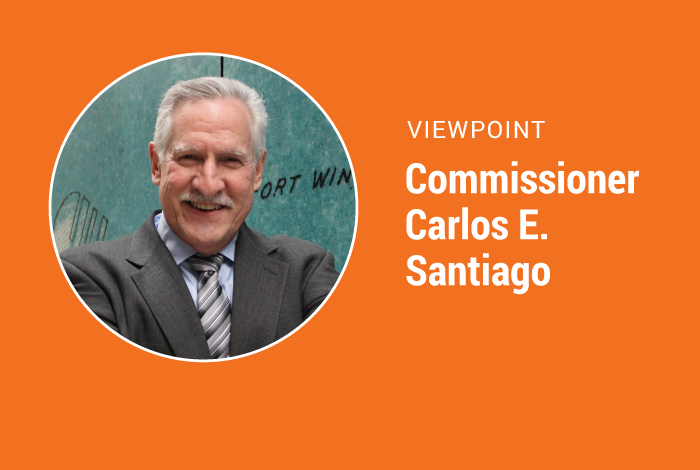
Commissioner Carlos E. Santiago
June 2, 2020
For those of us that came of age during the civil rights movement over fifty years ago, the horrendous video documenting the last nine minutes of the life of George Floyd is a disturbing reminder that the ideals and vision that Dr. Martin Luther King, Jr. espoused are far from being realized. It is sad to say that many of us fear that the acknowledgment of racial injustice and the need for reconciliation that this country has never addressed will likely not be realized during our lifetime. As in the ‘60s, now is the time for us to promote the boldest of ideas and policy implementations. Status quo can no longer go unchallenged. No matter how many rockets we send to space or how effective we might be in developing a COVID-19 vaccine, American exceptionalism will always fall short if our country and our society do not confront its racialized origins and legacy. I wish I could say otherwise, but when it comes to race in this country, little seems to have changed—only that pepper spray, rubber bullets, and tear gas used today have replaced the police dogs and water hoses of the past.
In a recent Zoom meeting, I asked all staff working remotely for the Department of Higher Education to reflect on Why you do the work you have been charged to do knowing full well that you already know What you need to do and How to do it. I would argue that everything we have promoted has been to open the doors to a quality higher education for all students, but more recently, underserved students of color. The BHE's Equity Agenda highlights initiatives and policies that promote long term social mobility and there is no doubt in my mind that this goal drives many of us in our work. But perhaps now, after this tumultuous last week, I need to rephrase the questions I posed to you. For example, why do you do what you do when the events of the last week reaffirm that our stated goal – racial equity – has always been illusory in the United States? How do you maintain a sense of hopefulness about your work and what we can achieve on our equity goals when reality might suggest that it's naïve to be hopeful about educational equity and racial justice? Each one of us must come to grips with this reality—note I did not say 'new' reality as these circumstances seem to have always been with us. But as those who put everything on the line to launch the civil rights movement and fought and persevered despite tremendous adversity, we must do everything we can to keep our ‘eyes on the prize.’
The Equity Agenda launched by the BHE in Fall 2018 is now more necessary than ever before. It behooves us to forge ahead knowing full well that resources will be scarcer than in previous years and those inevitable distractions will attempt to alter our focus. Courage, resiliency, and steadfastness will necessarily guide our actions that will ultimately result in greater educational opportunities and better student outcomes for students of color, to the benefit of all members of society.
To our Black colleagues, we see you. We are listening. Waking up and doing work in these times can be difficult and incredibly exhausting. We are here for you.
I encourage all staff to read the messages issued by two prominent African American leaders in higher education – a message from Emerson College President M. Lee Pelton and a message from Kentucky SHEEO Aaron Thompson.
During these times, I am grateful for the work of Department staff and our collective efforts to promote racial equity. I am committed to advancing the Equity Agenda and invite your comments and feedback on how we can continue to create a space where we address racism in higher education.